Table of contents
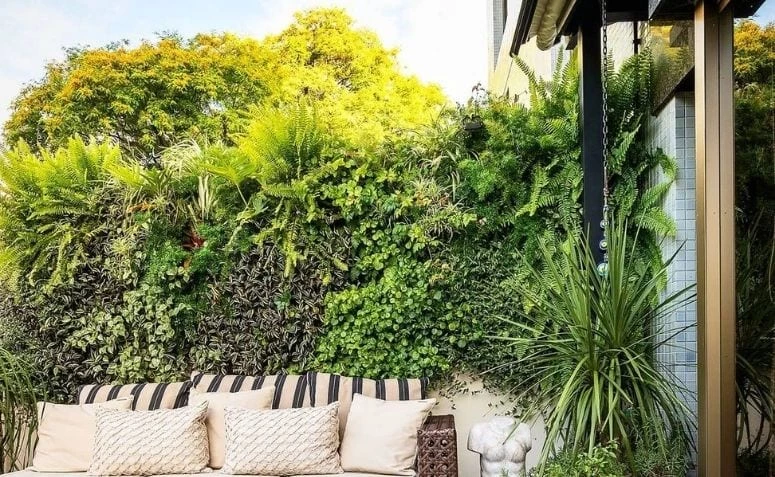
Plants bring beauty, comfort, and a more natural air to environments, so why not have them at home? A nice way to add them to a space is to make a green wall in the place. Read on to find out how to make this wall, the best plants for it, and beautiful inspirations!
See_also: 40 environments with beautiful and inspiring striped walls4 interesting ways to make a green wall
A green wall can be done in many different ways and in different areas. With so many options, it can be difficult to decide which is the most suitable for your home. With that in mind, we have separated information about the main models of this type of wall so that you can get to know them and decide which one to do!
Living Fence
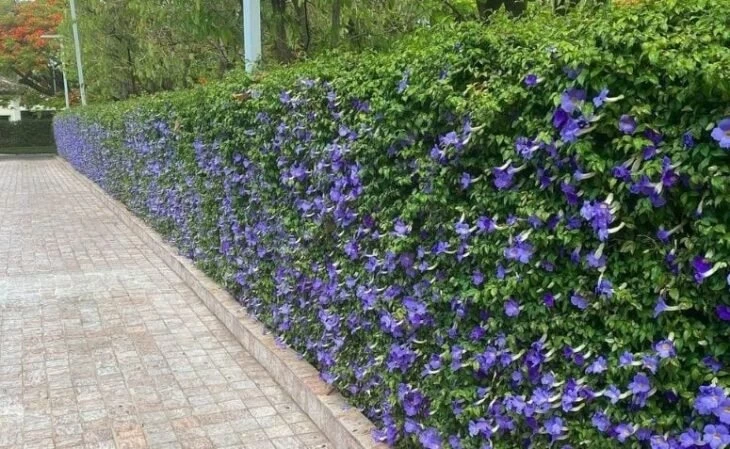
The living fence demarcates a space only with the use of plants, or even with the vegetables accompanying the wall of the residence. For this reason, it is usually seen around houses in the city or in the countryside. The most commonly used plants in this model of green fence are shrubs, for the look they give to the fence.
- First of all, know and prepare the soil in which the plants will be grown. You need to find out the characteristics of the soil to know what will grow well there and make sure it is level and uniform. This way, the fence will grow properly and will not become crooked.
- Next, choose the species of plant that will be used for the fence. The species must be defined according to the soil, climate, your taste and preferences. If you want privacy, for example, you will have to grow a fence with taller plants.
- After choosing the plant, plant the seedlings in the ground. Remember to give adequate space between one seedling and another, considering the species, size, and thickness of the plant.
- After planting, you have to wait until the seedlings have grown to give the fence the look you want. This will vary according to the species grown. Some plants can take up to 4 months to fully develop.
- When the plants are grown, prune and maintain them so that your living fence is healthy and beautiful!
External green wall
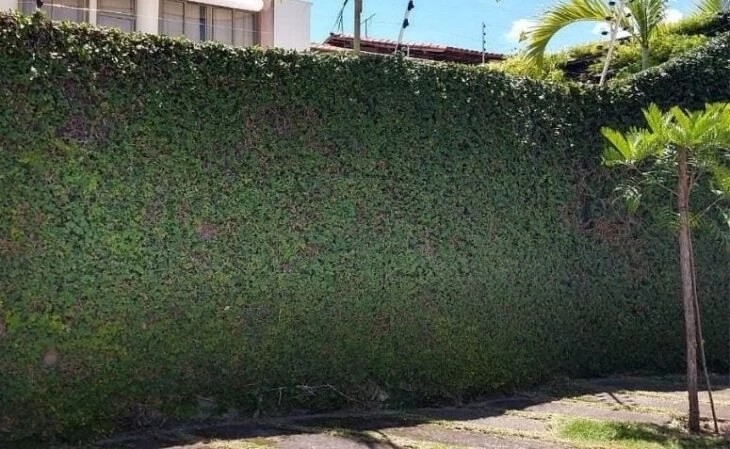
The green wall can also decorate the outside area of your home, such as a backyard or a facade. In this case, the plants usually take up the entire length of the wall to hide the concrete and thus make the environment more beautiful.
- First, you must prepare the structure of the outside area well enough to receive the vegetation. That is, you need to check it for infiltrations, eliminate cracks in the wall, paint it, and waterproof it.
- Then plant the seedlings close to the wall, but not exactly on the wall. This is important, because the plant can't take root in the wall. So open up spaces in the ground near this structure, place the seedlings facing the wall, and plug the openings with soil.
- The plant will grow in time and will cover the outside wall little by little. Your job at this stage is to water it with a hose or by means of a drip system added to the wall.
- Also remember to prune monthly or every other month to direct the growth of the plant on the wall.
- When the vegetation covers the entire length of the structure, you can reduce the frequency of pruning. But, it is necessary to continue with regular maintenance to take care of your green wall.
Internal green wall

This type of wall is a good option to bring nature into closed environments, such as a living room or the balcony of an apartment. The plants can occupy the entire wall or only a part of it.
- Just as with the external green wall, here the first step has to be to analyze the wall, correct possible problems, and waterproof it to avoid problems in the future.
- Next, install bases for planting the seedlings. Ideally, this base should be very close to the wall so that it doesn't show. Growing long plants is also a good idea to hide the support.
- After preparing your environment to receive greenery, choose one or more plant species that you like and that are well suited to the amount of lighting that this space receives daily.
- Plant at the base and wait for the seedlings to grow. Again, the time will vary depending on the plant species you choose. Remember not to try to speed up the process by planting too many seedlings into the space, as this can damage and even kill them.
- After they have grown well, prune them if necessary, and perform regular maintenance on your wall.
Green wall with pots
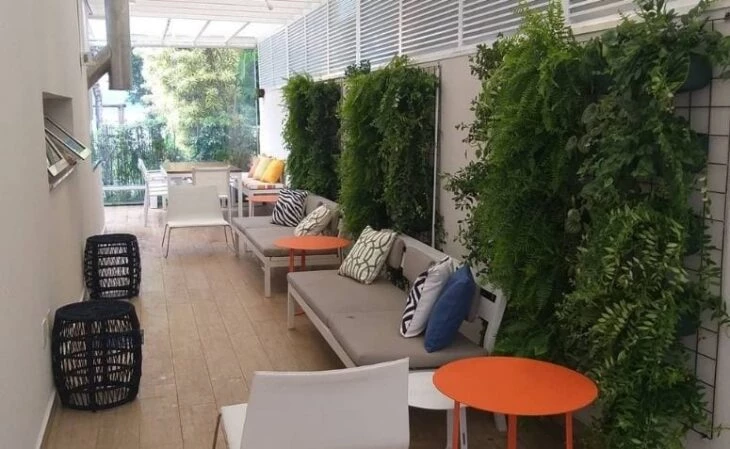
This model, which is like a vertical garden, is ideal for those who don't have time to take care of a space with so many plants or don't want to make major changes in the structure of the environment.
- First, you have to define how the pots and the support will be placed on the wall. Will it be conventional pots attached to a wooden base? Or PETS bottles attached to a large metal support?
- Next, see which species do well in your area, match the lighting in your location, and like the type of pot you want to use.
- Install the support for the pots, which can be anything from nails to large wooden bases, on the wall. Also remember that the pots can occupy the entire structure or only a part of it.
- Plant the seedlings in pots and then put them on the wall of your house!
As you can see, this type of wall can be adapted to large, small, external, and internal spaces.
Ideal plants for green walls
For the wall to give a nice result, you have to select one or more plants that are suitable for this type of covering, so below we have separated 5 species that are ideal for it:
- American Fern: is mainly used in interior green walls, because it does not need much light to grow. In addition, the American fern ( Nephrolepis exaltata ) is easy to grow and affordable.
- Boxwood: o Buxus sempervirens It grows slowly and is also easy to grow.
- Ivy: the ivy ( Hedera helix ) is suitable for outside green walls, since it is a climber and creates a beautiful effect on the structure with its finely cut leaves. However, this plant prefers mild climates, so make sure it is suitable for your region.
- Cat's Claw: a Uncaria tomentosa is only recommended for external walls, because it retains a lot of moisture in the structure. It is interesting for external areas because of the appearance it gives the area and because it grows fast, so it can fill in the wall faster than other species.
- Tumbergia: the tumbergia ( Thunbergia grandiflora ) is one of the favorite options for those who want to color their wall green. This is because it gives very beautiful blue flowers and also grows quickly. When it is in bloom, remember that the plant attracts butterflies and hummingbirds.
These examples of ideal plants make it clear that no matter what type of wall you have, it will be beautiful, right? After all, they are all lovely!
See_also: 55 pictures of hallway pictures that decorate your home with eleganceTips for keeping the green wall healthy and charming
You have to take good care of your wall so that it always looks beautiful and beautifies your home, so now check out 6 essential tips to keep it healthy:
- Plant Selection: If you are going to grow more than one plant species on your wall, remember to choose plants with equal needs. This way, they will all receive the same care and stay healthy.
- Seedling distribution: when it is time to distribute the seedlings on the wall, pay attention to the distance between one and the other. They need to be spaced, according to the species, so that they grow, meet, and cover the entire structure.
- Fertilization: this activity has to be done regularly so that the plants grow and stay healthy. Give preference to organic substrates.
- Irrigation: it is recommended to water on alternate days, because in the vertical position the plants dry out more quickly. So, even though it is recommended for the chosen species to water at intervals, it is important to check the frequency of irrigation when they are upright.
- Pruning: pruning the wall has to be done regularly to make it look beautiful and elegant.
- Protection against pests and insects: It is also necessary to frequently apply products that protect the wall against pests and insects. This way you avoid problems in the structure and keep the plants healthy.
In addition to performing this care, pay attention to the plants when watering and pruning them to make sure everything is okay. If you see something different, talk to a professional to find out what is going on and how to solve the situation.
30 green wall pictures to inspire your wall assembly
Now that you know what the main green wall options are, which plants to grow, and how to care for this structure, it is time to check out models to inspire you! So check out the 30 beautiful ideas that we have separated:
1. the green wall enhances your decor
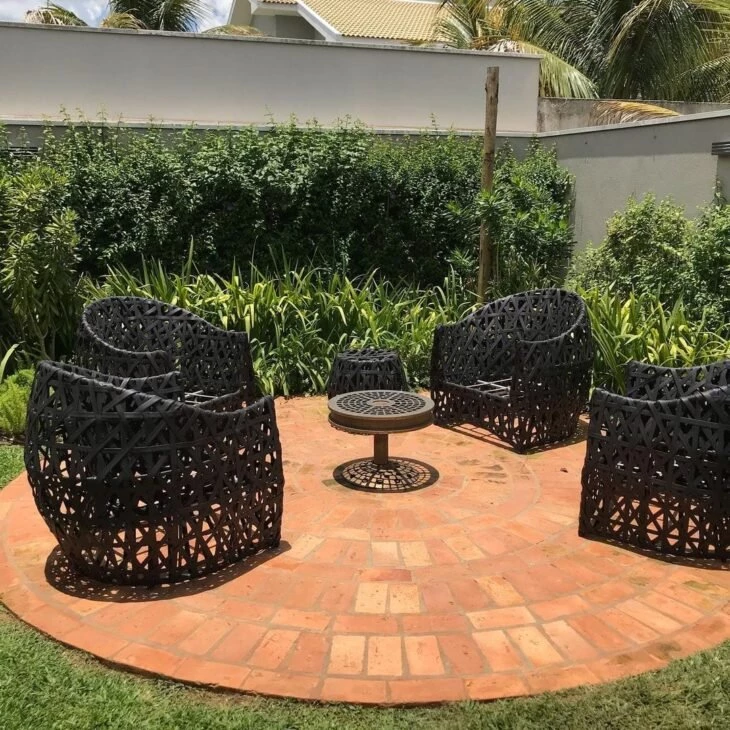
2. it also improves the acoustic and thermal comfort of the environment
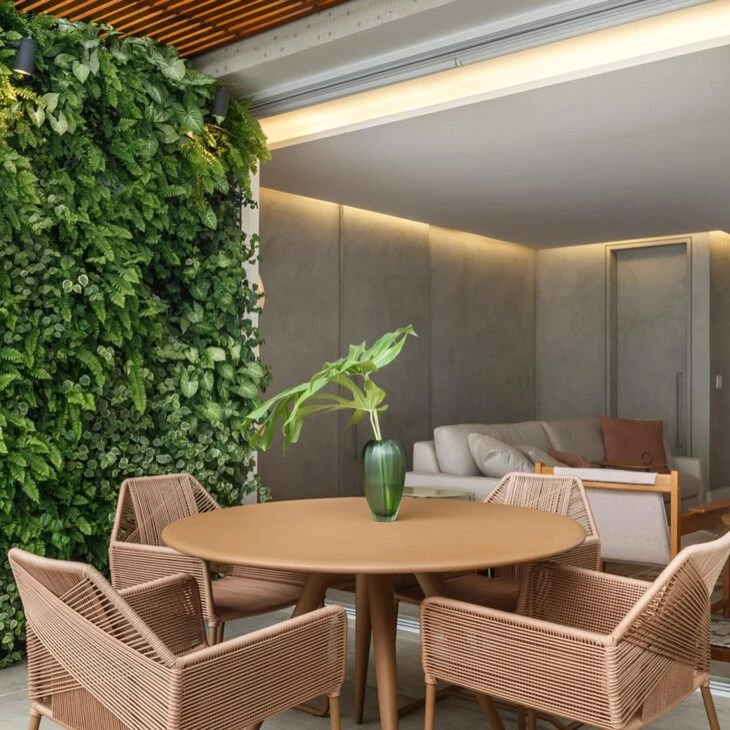
3. it is perfect for outdoor areas

4. the wall increases the feeling of relaxation near the pool
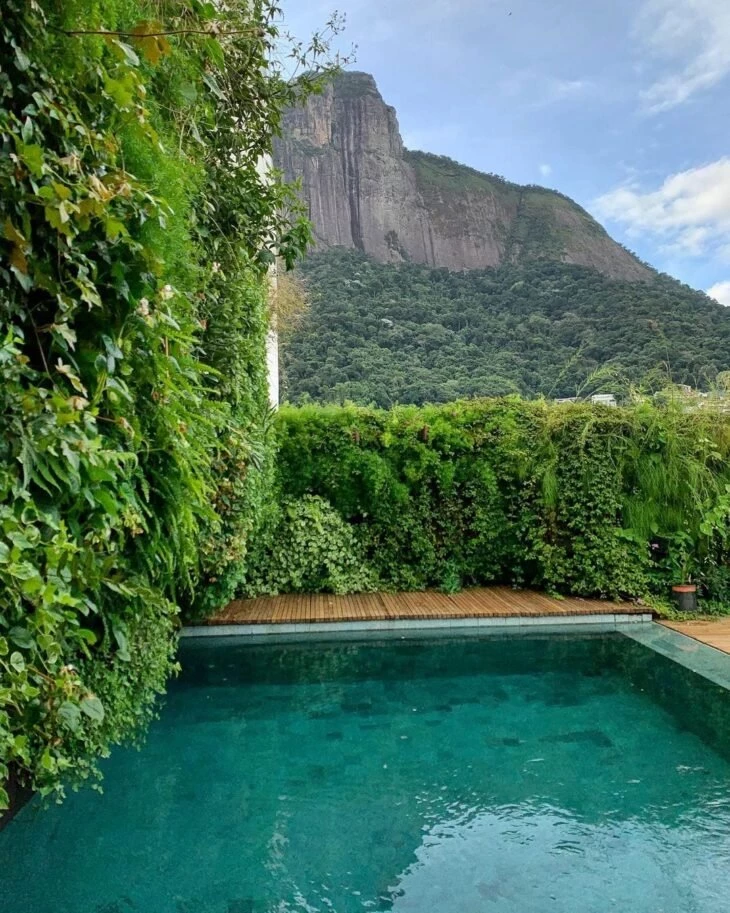
5. the living fence delimits the space in a charming way

On the façade, plants bring beauty

7. and make your property stand out among many others
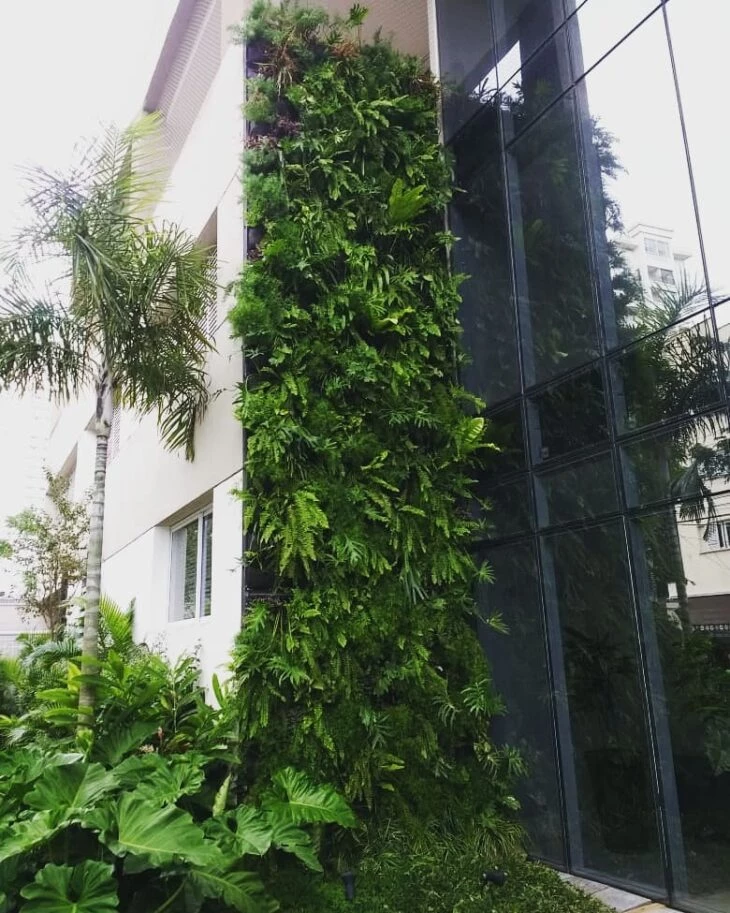
8. the green wall can also be done on balconies

9. it creates a beautiful integration between the inside and outside
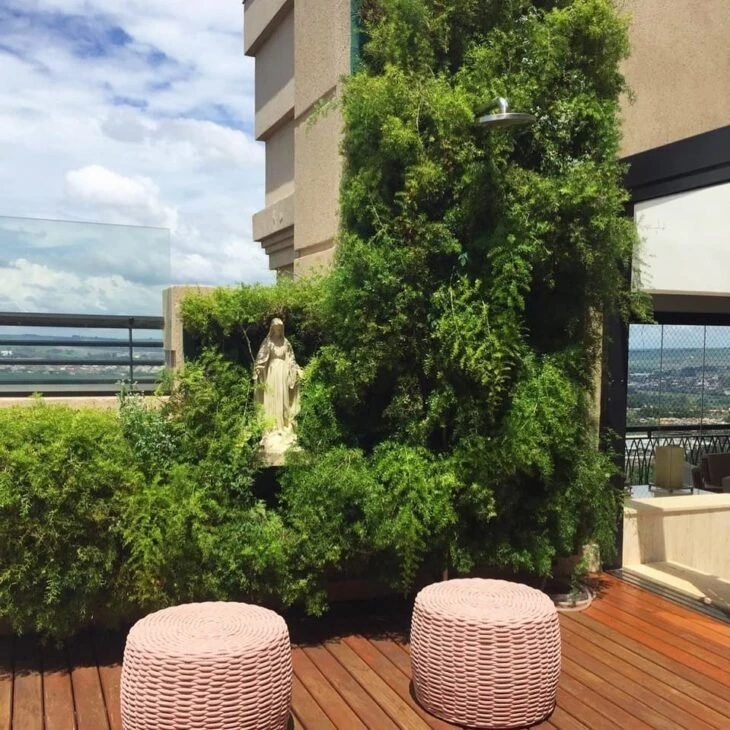
10. in internal spaces, it brings nature inside

11. this corridor totally changed after the addition of the plants

12. a green wall with natural plants looks amazing

13. besides being beautiful, it can improve air quality

14. but you can also use artificial plants
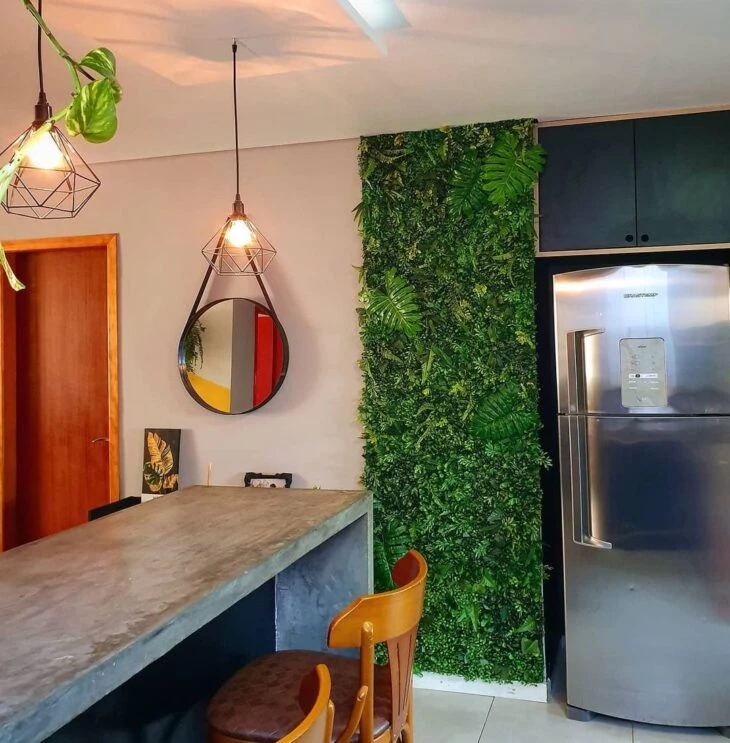
15. they are ideal for those who do not have time to take care of the wall

16. and also provide a beautiful result
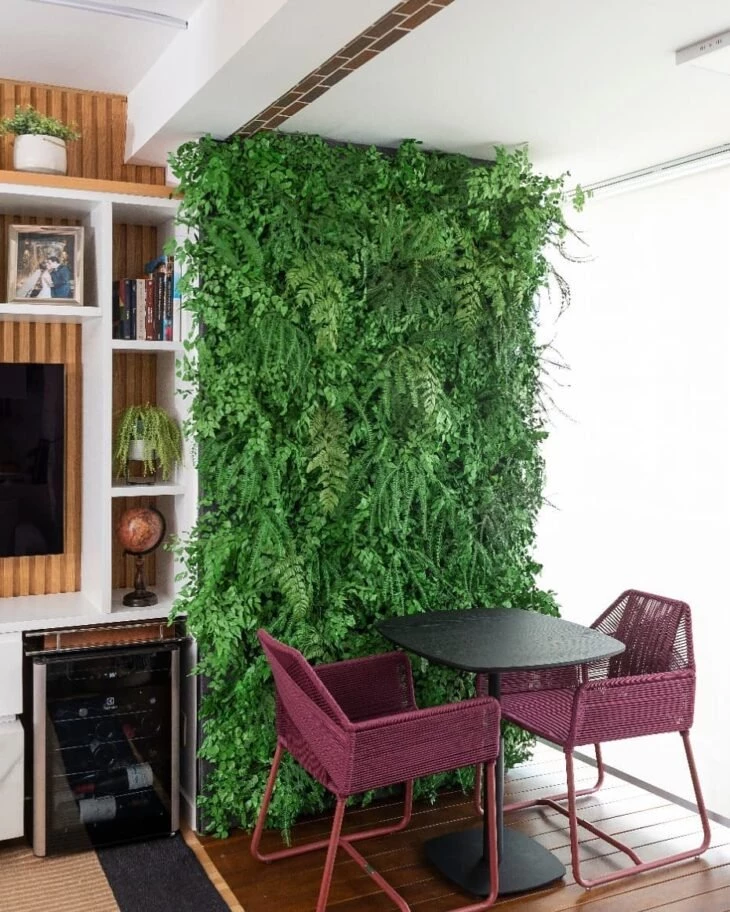
17. the green wall with moss gives a unique look to the site

18. another advantage is that it requires no maintenance
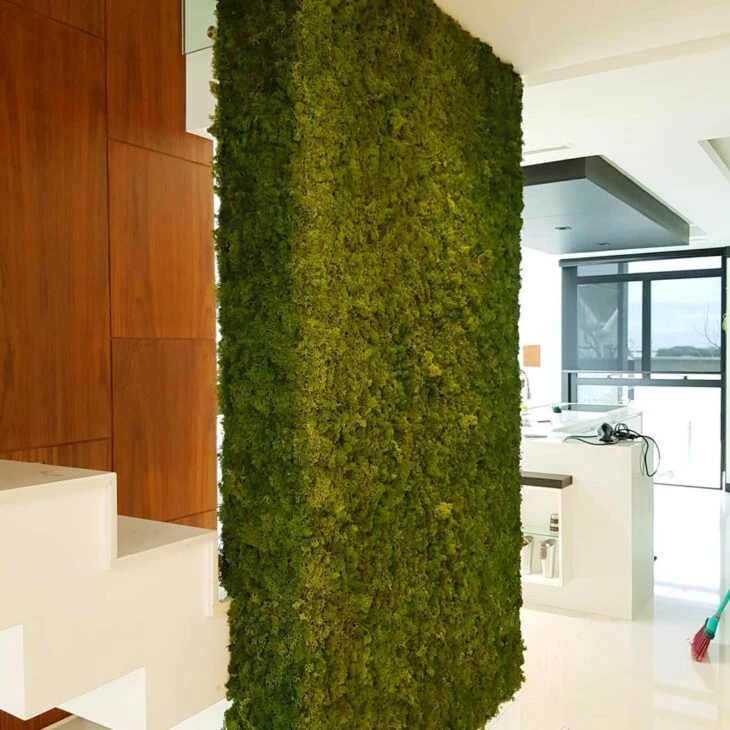
19. the model with vases is great for small and medium locations
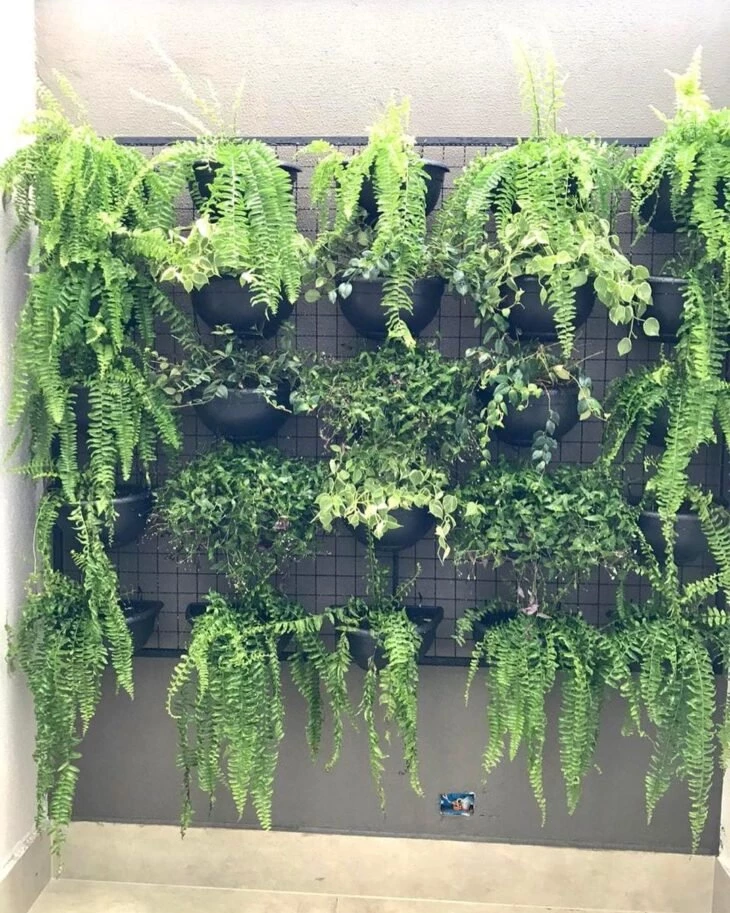
20. it makes good use of the space and makes it more charming
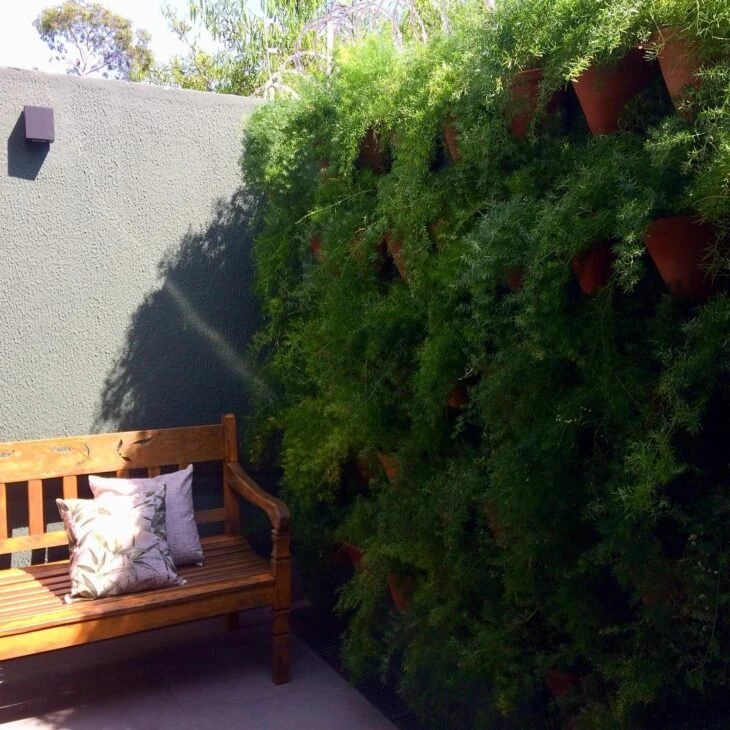
21. in a larger area, the plants can be fixed in specific modules

22. a nice idea is to combine the wall with wood
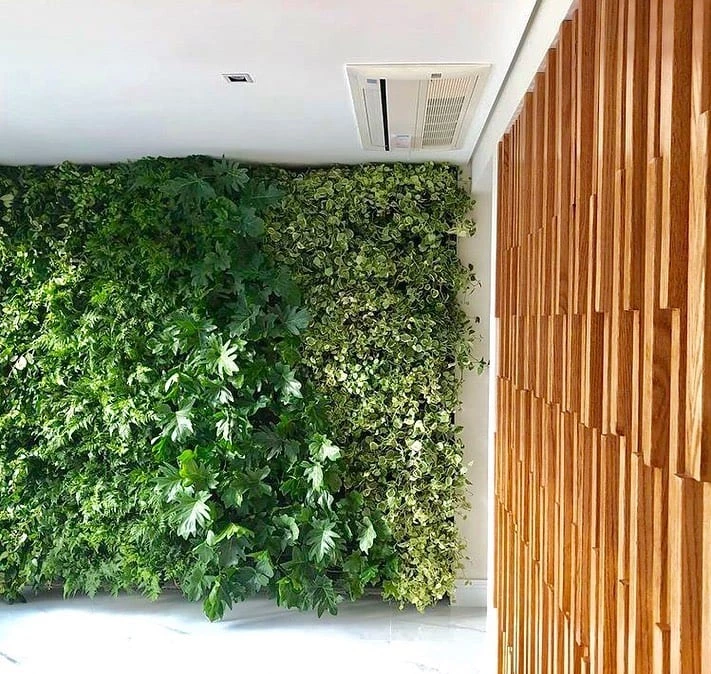
23. the material can be present in furniture or in the structure
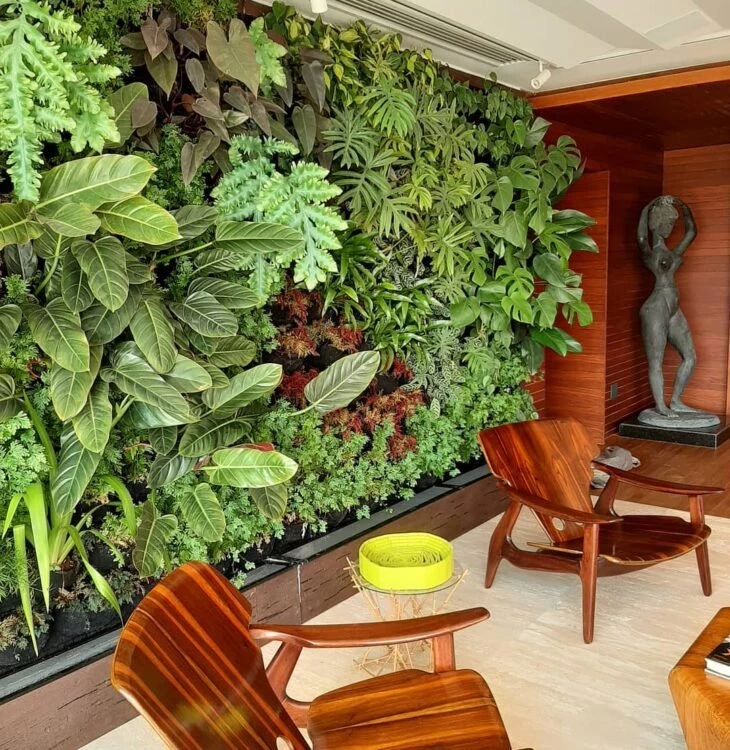
24. these two elements together refer to nature
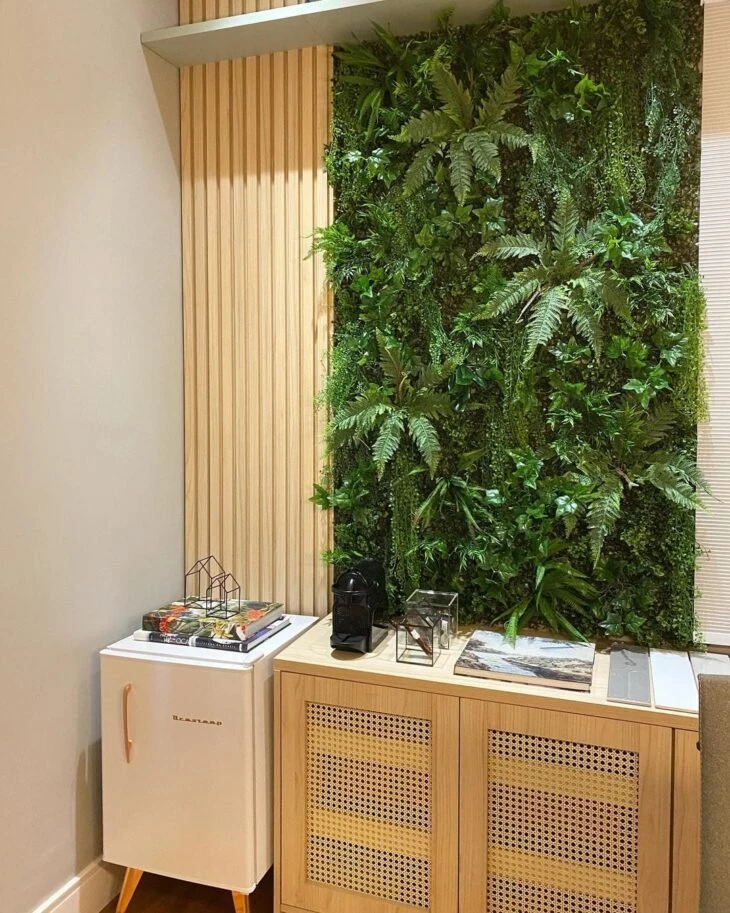
25. and the environment becomes even more enchanting

26: Mixing species on the wall also increases its beauty
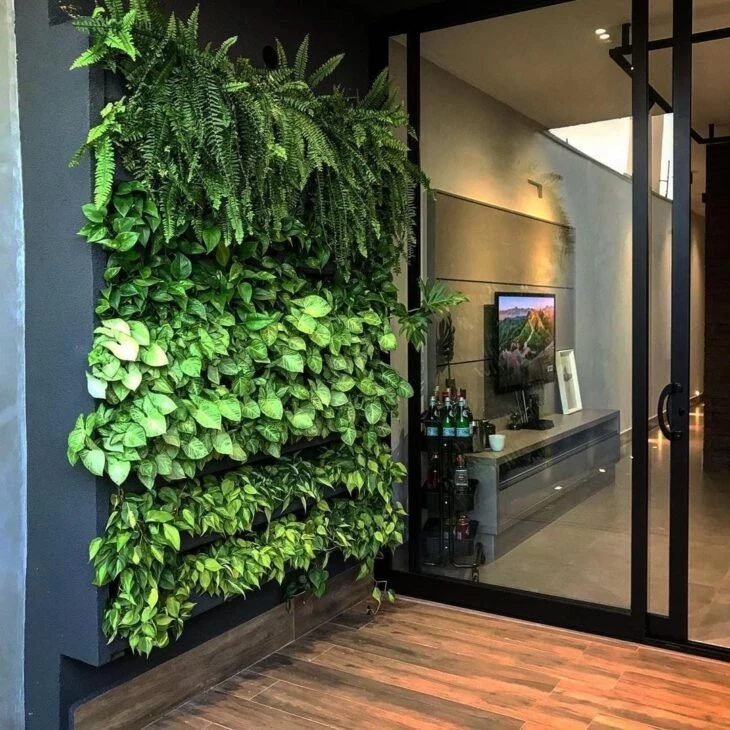
27 - To have a more colorful wall, bet on plants of various colors
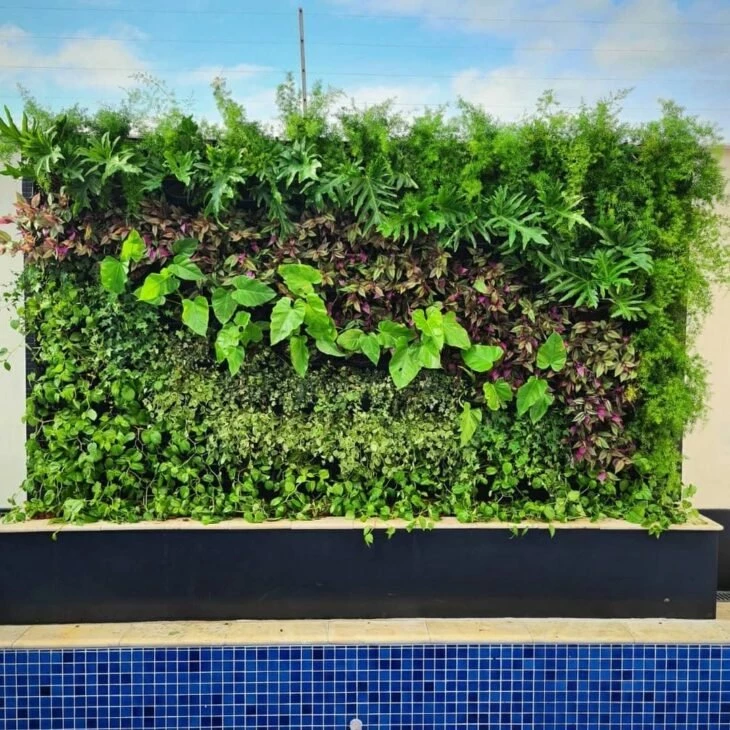
28. this combination is great to bring more life to the place

29. placing vases increases the elegance of the area and the wall

30. in any case, the green wall will be amazing for your home!

Do you already know which type of green wall you are going to use in your home after seeing so many interesting options? If not, but want to take advantage of its benefits, take a look at English wall options.


